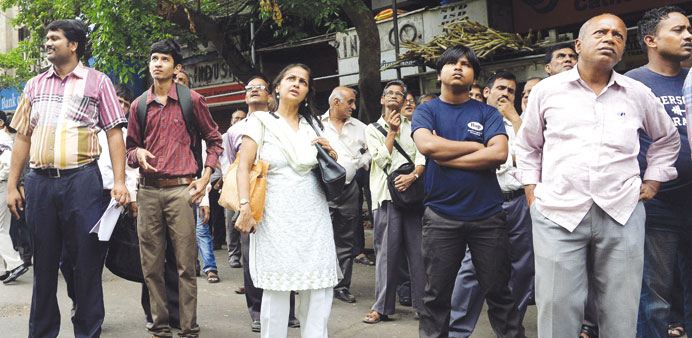Pedestrians watch as a digital broadcast presents the rolling share price information and national election results on the facade of the Bombay Stock Exchange building in Mumbai. The Sensex jumped more than 6% to a record high of 25,000 points yesterday.
The BSE Sensex and Nifty surged to record highs while the rupee strengthened to an 11-month peak against the dollar yesterday as the opposition Bharatiya Janata Party led by Narendra Modi swept to a resounding majority in the world’s largest election.
Domestic-focused shares such as ICICI Bank and Ambuja Cements soared, reflecting hopes the BJP and its National Democratic Alliance are best placed to revive an economy growing at its slowest in a decade, while exporters like Infosys suffered from a stronger rupee.
The wider-than-expected BJP win spurred several investment banks, including UBS and Deutsche Bank, to raise their targets for domestic shares, as they noted indexes are still relatively inexpensive and thus have more room to gain. Still, most market gains were later capped and analysts cautioned the rally will now need to be justified, as key tests loom for the government, including the selection of a cabinet.
Other critical areas for investors include the new government’s relationship with a central bank focused on inflation and the need to deliver a budget that can reassure markets and credit agencies about the fiscal deficit.
“Clearly financial markets have gone far ahead of fundamentals,” said Ananth G Narayan, co-head of wholesale banking for South Asia at Standard Chartered in Mumbai.
“The next 100 days will be critical for the next government to revive the investment climate.” The strong market gains come less than a year after India was gripped by its worst currency crisis since the balance of payment crisis in 1991.
Although investors also credit measures taken by the outgoing Congress party and the Reserve Bank of India for stabilising markets, gains have accelerated since the BJP named Modi as its candidate for prime minister in mid-September, with the Sensex up 22% since then.
As a result, India has gone from one of the most vulnerable emerging countries to one of the favourites among foreign investors; overseas funds have poured more than $16bn into Indian stocks and bonds in the past six months.
The Sensex gained as much as much as 6.1% to a record high at 25,375,63 before ending the session up 0.9% - a gain that makes it the third-best performer in Asia in dollar terms so far this year after Indonesia and Pakistan. The rupee strengthened to as much as 58.62 per dollar, its highest since late June 2013, marking a 17.5% gain since the record low hit in August.
The benchmark 10-year bond yield fell as much as 10 basis points to 8.68%, its lowest since February 6.
The rupee strengthened to its highest level in 11 months yesterday and posted its best weekly gain in eight months as the Bharatiya Janata Party and its allies headed towards an overwhelming majority in the country’s elections, sending Indian shares to record highs.
The rupee however failed to retain most gains made during the session on the back of profit-taking in domestic shares and sporadic dollar buying intervention by the central bank.
The partially convertible rupee closed at 58.79/80 per dollar after hitting 58.62, its strongest since June 19 and 0.85% above its previous close of 59.29/30.
For the week, the rupee rose 2.1%, its third consecutive weekly gain and also its biggest weekly rise since the week to September 13.
Traders expect the rupee to hold in a 58.50 to 59.50 per dollar range for the next week.
In the offshore non-deliverable forwards, the one-month contract was at 59.09, while the three-month was at 59.73.
Investors will now expect the BJP to deliver.Most immediately, a Modi-led government is expected soon to fill key cabinet posts such as finance minister, which is widely seen as going to Arun Jaitley, a senior BJP leader. As the BJP focuses on reviving growth and investments, it will need to accommodate the RBI, whose Governor Raghuram Rajan has made fighting inflation a priority since taking the helm of the central bank in September.
The BJP will also need to deliver a budget that addresses the fiscal deficit in a way that is credible to investors and rating agencies.
The high markets hopes were reflected by the rally in domestically focused shares that would benefit most from an economic recovery. Analysts said shares were still not too expensive, with UBS estimating the broader Nifty is trading at around its five-year historical average.
The Bank Nifty surged as much as 10.6% to a record high, putting its gain at 38.3% so far this year.

